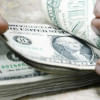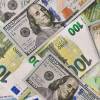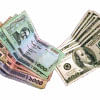BB lets bankers offer existing dollar rate to exporters

In its effort to arrest the fall in forex reserves and bring unrealised export proceeds into the country, the Bangladesh Bank today allowed bankers to offer the existing US dollar exchange rate to exporters.
The relaxation comes nearly two weeks after the central bank introduced the crawling peg exchange rate system, which allows the exchange rate to hover around a band, and set the mid-rate at Tk 117 in order to gradually allow the market to determine the exchange rate.
The new rate was 6.36 percent higher than Tk 110 per US dollar previously fixed by bankers based on an unofficial directive from the central bank.
Following the relaxation, the inflow of US dollars is likely to increase, bankers said.
In March last year, the central bank asked banks to buy the greenback from exporters based on its value on the due date of proceed realisation rather than the prevailing rate.
As per the rule, exporters are required to bring export proceeds within four months of shipment.
However, there is an allegation that a section of exporters has not brought their export proceeds as the exchange rate of the US dollar has been kept artificially lower than the market rate.
This creates a discrepancy between the actual realisation of export proceeds and shipment value.
For example, data of the Export Promotion Bureau (EPB) showed that Bangladesh shipped $43.55 billion worth of goods in the July-March of fiscal year (FY) 2023-24.
In reality, the amount of export proceeds realised during the period was $40.87 billion, indicating a gap of $2.68 billion, the data showed.
During FY23, the gap in export data between the EPB and the central bank was roughly $12 billion.
"We want the proceeds to come to the country. So, we have revoked the previous rule," said a senior official of Bangladesh Bank.
A top official of a private bank said before the relaxation of the rule, exporters did not get the prevailing rate of the greenback.
"There was a penalty for exporters. Now that rule has been revoked, the flow of unrealised export will increase and help increase reserves," he said.
"It appears the purchasing cost of dollars of banks will increase. So, importers will find the greenback costlier," the official added.
However, following the easing of the rule, those who brought their export proceeds earlier to comply with the rule are ultimately losers, according to the official.
Despite various measures, Bangladesh's foreign exchange reserves have been falling since September 2021.
On May 15, the gross international reserves as per the International Monetary Fund's calculation was $18.42 billion, which was equal to over three-and-a-half months of import bills. The nation's monthly import bill is around $5 billion.
The current reserve amount in Bangladesh barely meets the International Monetary Fund's minimum benchmark for countries to clear import payments.

 For all latest news, follow The Daily Star's Google News channel.
For all latest news, follow The Daily Star's Google News channel. 








Comments